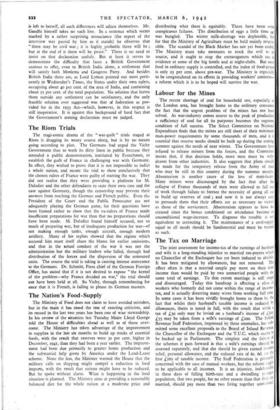The Tax on Marriage
The joint assessment for income-tax of the earnings of husband and wife is a long-standing injustice to married tax-payers which no Chancellor of the Exchequer has yet been induced to abolish. It has been mitigated by allowances, but not removed. The effect often is that a married couple pay more on their joint income than would be paid by two unmarried people with the same total of earnings. To that extent marriage is still taxed and discouraged. Today this handicap is affecting a class tI workers who formerly did not come within the range of income- tax, and is actually deterring many wives from working full time In some cases it has been vividly brought home to them by the fact that whilst their husband's taxable income is reduced by allowances, theirs is taxed in full, with the result that while a tax of ,C30 only may be levied on a husband's income of L30°, £55 may be taken from a wife's earnings of £200. The Inland Revenue Staff Federation, impressed by these anomalies, has sub' mitted some excellent proposals to the Board of Inland Revenue, the Chancellor of the Exchequer and the T.U.C. which ought to be backed up in Parliament. The simplest and the fairest of the schemes it puts forward is that a wife's earnings should be assessed separately, and that she should be given earned interne relief, personal allowance, and the reduced rate of 6s. 6d. CO the first £165 of taxable income. The Staff Federation is prillaalliy concerned with the case of manual workers, but the reform ought to be applicable to all incomes. It is an injustice, indefensible in these days of falling birth-rate and a dwindling yeungel population, that two people, for no other reason than that they are married, should pay more than two living together urunarried-


























 Previous page
Previous page